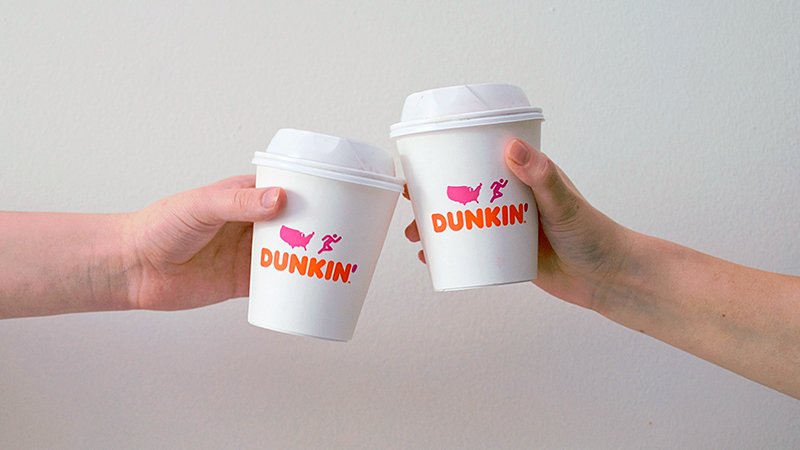Grow your business with the Discover newsletter
Logistics advice & insights straight to your inbox
Subscribe now
So, you’re launching a new business. Months of market research, competitor analysis, financial planning and strategizing are behind you, which just leaves one job – the exciting bit – deciding on a name for the business.
The name you choose is incredibly important; it’s your first opportunity to make an impact and intrigue people enough to get them to explore more about your product or service – and you have just one or two words to do it in.
A quick google around the subject of “naming your business” will display countless – and conflicting – tips. Some are in the thought camp that your business name should explain what it does (you certainly know what you’ll find when you visit the We Sell Carpets1 website.) Some say it should just be something memorable; others suggest using humor. If you look at some of the biggest brand names in the world – Adidas, Starbucks, Google – the rules are confused even further, with the names seemingly random. But dig a little deeper and usually there’s a story to uncover. Google’s name, in fact, comes from the mathematical term ‘googol’; the number one followed by one hundred zeros. The word was chosen to signify the search engine’s unlimited supply of information2.
Despite their global dominance, the famous brands mentioned above cannot attribute their success solely to their name, of course. It's just one part of the branding journey and must work in harmony with a wider communications strategy.

The key is to remember what’s at the heart of every business: the customer. Understanding their motivations, their behaviors and what makes them tick is the key to business success and should also influence your name choice. In fact, there’s some pretty fascinating psychology around consumers’ decision-making processes which explains why a business’ name can be a powerful tool to engage them. We may think that, as consumers, the brands we love and choose are influenced by objective factors such as the product or service they offer, but research suggests there’s more to it. Studies involving functional magnetic resonance imaging3 – a technique which measures brain activity – shows that when evaluating brands, consumers primarily use emotions rather than information like brand features and facts4.
While most language is processed in the left side of the brain – our more logical, conscious brain – brand names also connect with our emotional right brain5. This suggests that to form a deeper engagement with customers, brand names should appeal to their emotions, rather than reason or logic. Market researchers at Executive Solutions6 found that emotions related to acceptance, competence and responsibility are most influential on purchasing decisions7.
Psychology aside, there are also lots of strategic considerations to bring into your naming decision, too.
Brand recall seems the most obvious, primary factor. In a crowded market, your brand’s name can be the hook that helps your business be remembered over similar competitors.
I speak to Jamie Chadwick8, a Brand Strategist, who uses the highly saturated insurance price-comparison market to demonstrate this point: “Almost every brand uses ‘compare’ somehow in their name. In the UK, two of the standout brands in the category use their names in very different ways. Confused.com9 creates space between itself and the competition by associating itself with the central category issue – it has taken a point of anxiety and turned it into brand equity – whereas Compare the Market10 brilliantly confuses everyone by calling itself Compare the Meerkat. This does two things, alongside a heavy dose of ad spend. Firstly, it creates top-of-mind awareness in a crowded marketplace, and secondly, it’s claimed, significantly reduces their search spend in an over-inflated category. In these cases, the brand name is more than a name, it is a marketing advantage that can be leveraged.”
The examples cited by Jamie show how a name can transform a business within a relatively dull product category into something fun that drives brand awareness and recall.

The right business name can help to define the look and feel of your product. So, do you choose something fun, something serious, or just go for something memorable? Here are some tips to help you decide:
Apple might seem a random name for a technology company, and the inspiration behind it was seemingly chance – Steve Jobs said he chose the name after he returned from an apple farm and thought the name sounded “fun, spirited and not intimidating.”11 Yet, it immediately differentiated the company from the corporate, techy stereotypes of its industry; here, instead, was a fresh brand with bold new ideas – later reinforced by its ‘Think Different’ slogan.
The name you choose for your business will set the tone of voice across all your communications.
Smoothie brand Innocent12 went through several name changes before settling on their current label13. A good thing too; they now have a name that perfectly encapsulates their products’ ethos – simple, healthy, and additive free. The tone of voice used across the brand’s packaging and marketing communications is colloquial and playful, and their logo looks like a child’s drawing. Together these elements have created a fun and engaging brand that really emphasizes the wholesomeness of its recipes.
Choose a distinctive name and you’ll grab consumers’ attention and stay front of mind later in the purchasing journey. Not one for playing by the rules, Elon Musk has called one of his latest ventures The Boring Company14. It’s perhaps unsurprising that a publicity guru such as Musk would choose something so attention seeking but there’s actually a little (self-deprecating) meaning behind it too; the company is a construction service with ambitions to dig – i.e. ‘bore’ – an extensive tunnel system for high-speed automobile travel.
Humor can certainly give your business name an impact, just make sure it works in context, and will still be appropriate as your brand develops over time.

Pig & Hen15 is an Amsterdam-born business producing handcrafted bracelets made from real ship rope and marine-grade steel. The brand’s name is inspired by an old sailing tradition from the early 1600s, when mariners would ink tattoos of a pig and hen on their feet for good luck because crates of these animals were often the only items left floating after a shipwreck. This storytelling engages customers, conjuring up images of sea-time adventures and giving the brand a layer of authenticity.
Many years ago, Apple launched its iconic “Get a Mac” campaign. A series of commercials were run which showed two contrasting guys: one young hipster who introduced himself by saying “Hi, I’m a Mac”, and an older nerd portraying a PC. The message implied that the kind of computer you use signifies what sort of person you are. It was so effective because it built on the school of thought which says the meaning and value of a brand is its role in helping consumers create and build their self-identities16.
You can leverage this idea to your advantage, too. Research shows that people tend to have positive associations with brands that reflect images consistent with their own identity17, so, when naming your business, remember your target customer. Who are they? What do they aspire to? What motivates them? Choosing adjectives that reflect personality traits they identify with or wish to emulate will resonate the brand with your target customer and inspire a connection.
One of the reasons Amazon was given its name was because it launched at a time when websites were often listed alphabetically18. Search engine results page (SERP) algorithms have progressed significantly since then, so your prioritization of it should, too. In fact, it’s perhaps one of the most important strategic considerations when choosing a business name as it ensures your customers find you easily in search.
Firstly, it’s important to choose a unique company name; too generic and it will be competing on search with not only everyone in your industry, but every other business whose name is similar or overlaps on any of the words. A quick search on Google will tell you whether your chosen name is a good contender, or you should go back to the drawing board.
Will consumers know how to spell the name intuitively? It’s important to consider how the word translates into other languages if you have international ambitions for your company. It might turn out that the brand name you were initially so pleased with has an offensive meaning in another language so be sure to check.
Lastly, don’t forget to check that your preferred website domain name is available. E-commerce platform Shopify19 has a free business name generator20 that will suggest names based on words you use to describe your business and auto-generate available domain names in seconds for you to pick from. The ideal scenario is to keep it simple and have the same website address as your company name.

Ensure that the brand name will not be limiting as your business grows; you don’t want to restrict yourself if you want to diversify your business further down the line. For example, it’s better to call yourself Nana’s Little Bakery than Nana’s Cupcakes if you think you might expand your product range in the future. Weight Watchers has recently overcome such a hurdle by rebranding as WW21 to reflect its shifting focus from diets to wellness. And in 2019, Dunkin’ Donuts22 changed its official trade name to just Dunkin’ – more appropriate given that coffee and other drinks now make up 60% of its sales23.
When you consider all these factors, the complexities of choosing a name for your business become apparent. But it’s important to remember the bigger picture. I speak to Steve Harvey, co-founder of creative agency Fabrik Brands24, which helps clients develop their brand strategy, website design and marketing communications. He explains: “Like all components of a brand, each one on its own can only do so much. Ultimately, every brand asset, from your name, to your logo, to the colors that appear on your website, need to work together to build a relationship with an audience.”
“Choosing a name that is rooted in the DNA of the brand is important. Unlike a human name, which can take on different meanings as you get to know a person, a company name aims to share information instantly, and structure the perception people have of that entity. The right name immediately resonates with your audience and shows them that you’re on the same level.”
As for Jamie, he believes it comes down to a simple formula. “Define you’re doing and what you stand for, and then think about the name. It will probably spill out naturally.”
Speak to a DHL expert today to discover other ways to help your business grow.
1 - We Sell Carpets
2 - Google name origin, Wikipedia, 2020
3 - Functional magnetic resonance imaging, Wikipedia, 2020
4 - Psychology Today, February 2013
5, 6, 7 - The Name Game: The Delicate Psychology Behind Multi-Million Dollar Brand Names, Medium, July 2018
8 - Jamie Chadwick, Strategy Director, Black Stump Strategy
9 - Confused.com
10 - Compare the Market
11 - Steve Jobs, Branding Strategy Insider, November 2011
12 - Innocent
13 - Innocent blog, September 2006
14 - The Boring Company
15 - Pig & Hen
16 - Self-Construal, Reference Groups, and Brand Meaning, December 2005
17 - Self-Construal, Reference Groups, and Brand Meaning, December 2005
18 - 15 Companies That Changed Their Names, Mental Floss, September 2017
19 - Shopify
20 - Shopify business name generator
21 - WW
22 - Dunkin’ Donuts
23 - AdAge, September 2018
24 - Fabrik Brands